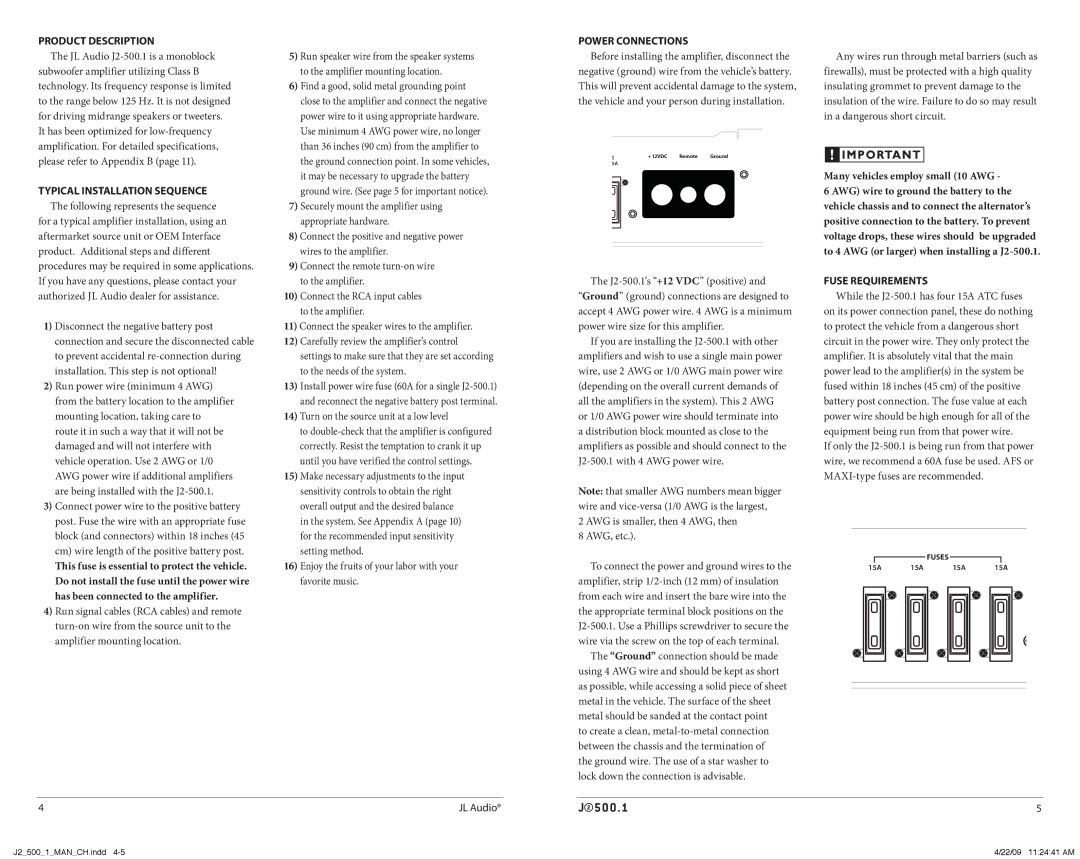Product Description
The JL Audio J2-500.1 is a monoblock subwoofer amplifier utilizing Class B technology. Its frequency response is limited to the range below 125 Hz. It is not designed for driving midrange speakers or tweeters. It has been optimized for low-frequency amplification. For detailed specifications, please refer to Appendix B (page 11).
Typical Installation Sequence The following represents the sequence
for a typical amplifier installation, using an aftermarket source unit or OEM Interface product. Additional steps and different procedures may be required in some applications. If you have any questions, please contact your authorized JL Audio dealer for assistance.
1) Disconnect the negative battery post connection and secure the disconnected cable to prevent accidental re-connection during installation. This step is not optional!
2) Run power wire (minimum 4 AWG)
from the battery location to the amplifier mounting location, taking care to route it in such a way that it will not be damaged and will not interfere with vehicle operation. Use 2 AWG or 1/0 AWG power wire if additional amplifiers are being installed with the J2-500.1.
3) Connect power wire to the positive battery post. Fuse the wire with an appropriate fuse block (and connectors) within 18 inches (45 cm) wire length of the positive battery post.
This fuse is essential to protect the vehicle. Do not install the fuse until the power wire has been connected to the amplifier.
4) Run signal cables (RCA cables) and remote turn-on wire from the source unit to the amplifier mounting location.
5) Run speaker wire from the speaker systems to the amplifier mounting location.
6) Find a good, solid metal grounding point close to the amplifier and connect the negative power wire to it using appropriate hardware. Use minimum 4 AWG power wire, no longer than 36 inches (90 cm) from the amplifier to the ground connection point. In some vehicles, it may be necessary to upgrade the battery ground wire. (See page 5 for important notice).
7) Securely mount the amplifier using appropriate hardware.
8)Connect the positive and negative power wires to the amplifier.
9) Connect the remote turn-on wire
to the amplifier.
10)Connect the RCA input cables to the amplifier.
11)Connect the speaker wires to the amplifier.
12)Carefully review the amplifier’s control settings to make sure that they are set according to the needs of the system.
13)Install power wire fuse (60A for a single J2-500.1) and reconnect the negative battery post terminal.
14)Turn on the source unit at a low level
to double-check that the amplifier is configured correctly. Resist the temptation to crank it up until you have verified the control settings.
15)Make necessary adjustments to the input sensitivity controls to obtain the right overall output and the desired balance in the system. See Appendix A (page 10) for the recommended input sensitivity setting method.
16)Enjoy the fruits of your labor with your favorite music.
Power Connections
Before installing the amplifier, disconnect the negative (ground) wire from the vehicle’s battery. This will prevent accidental damage to the system, the vehicle and your person during installation.
5A
The J2-500.1’s “+12 VDC” (positive) and “Ground” (ground) connections are designed to accept 4 AWG power wire. 4 AWG is a minimum power wire size for this amplifier.
If you are installing the J2-500.1 with other amplifiers and wish to use a single main power wire, use 2 AWG or 1/0 AWG main power wire (depending on the overall current demands of all the amplifiers in the system). This 2 AWG or 1/0 AWG power wire should terminate into a distribution block mounted as close to the amplifiers as possible and should connect to the J2-500.1 with 4 AWG power wire.
Note: that smaller AWG numbers mean bigger wire and vice-versa (1/0 AWG is the largest,
2 AWG is smaller, then 4 AWG, then
8 AWG, etc.).
To connect the power and ground wires to the amplifier, strip 1/2-inch (12 mm) of insulation from each wire and insert the bare wire into the the appropriate terminal block positions on the J2-500.1. Use a Phillips screwdriver to secure the wire via the screw on the top of each terminal.
The “Ground” connection should be made using 4 AWG wire and should be kept as short as possible, while accessing a solid piece of sheet metal in the vehicle. The surface of the sheet metal should be sanded at the contact point
to create a clean, metal-to-metal connection between the chassis and the termination of the ground wire. The use of a star washer to lock down the connection is advisable.
Any wires run through metal barriers (such as firewalls), must be protected with a high quality insulating grommet to prevent damage to the insulation of the wire. Failure to do so may result in a dangerous short circuit.
Many vehicles employ small (10 AWG -
6 AWG) wire to ground the battery to the vehicle chassis and to connect the alternator’s positive connection to the battery. To prevent voltage drops, these wires should be upgraded to 4 AWG (or larger) when installing a J2-500.1.
Fuse Requirements
While the J2-500.1 has four 15A ATC fuses on its power connection panel, these do nothing to protect the vehicle from a dangerous short circuit in the power wire. They only protect the amplifier. It is absolutely vital that the main power lead to the amplifier(s) in the system be fused within 18 inches (45 cm) of the positive battery post connection. The fuse value at each power wire should be high enough for all of the equipment being run from that power wire.
If only the J2-500.1 is being run from that power wire, we recommend a 60A fuse be used. AFS or MAXI-type fuses are recommended.
FUSES
15A 15A 15A 15A

